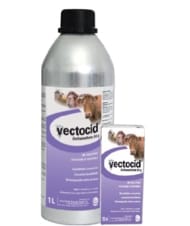VECTOCID is an emulsifiable concentrate containing deltamethrin. When applied as recommended it is effective to controls ticks, tsetse flies, nuisance flies, mange mites and lice. Protects against fly larvae. It is remanent and has a very low mammalian and environment toxicity effect. VECTOCID can be used on cattle, sheep, goats, camel and pigs.
METHOD OF APPLICATION :
Dipping: Premix by adding the required amount of VECTOCID to 10 volumes of water, stiring well. Pour the mixture in the dip tank. It is essential to thoroughly mix by dipping atleast 20 head which are returned to the main herd and dipped again.
- Initial filling: 1 litre of VECTOCID per 1000 Iitres of water. - Replenishment: 1 litre of VECTOCID per 1000 litres of added water. - Head count replenishment: After dipping 200 to 500 head add 250 ml of VECTOCID for every 100 heads.
- Hand Spraying: Premix as for dipping. Use 1ml of VECTOCID per litre of water. Apply minimum 3 litres of the wash to each animal, concentrating particularly on the predilection sites of the parasites. - Recommendations: Do not dip animals that are tired or thirsty. Avoid, dipping animals during the heat of the day
- Dilution Rates: ln general use one part of VECTOCID to 1000 parts of water. In certain cases veterinarians may vary the dilution rate and the intervals of treatment.
- Intervals between treatments: — Ticks: one treatment every 2 weeks is recommended but in case of high challenge and during rainy period, one treatment every week may be necessary. In some areas intervals may be extended during periods of low challenge. It is recommended to maintain a programme throughout the year. - Tsetse flies: Apply every 2 to 4 weeks depending on the challenge. - Mange: Two treatments of 10 days interval. - Lice: One treatment when required. - Nuisance flies and insects: One treatment every 6 to 8 weeks or when required.
WITHDRAWAL PERIOD
Meat and offal:3 days
Milk: Nil
PRECAUTIONS: For external use on animals only. Keep away from children. When manipulated, wear protective clothing and when spraying a facemask is recommended to reduce inhalation. Do not eat, smoke or drink while manipulated. Dangerous to bees,do not contaminate hives. Dangerous to fish, do not discharge surplus wash into streams or ponds. Remove and wash heavily contaminated clothing with soap and water. Rinse, puncture and crush empty containers.
FIRST AID: lf the eyes are splashed rinse thoroughly with clean water. If swallowed seek medical advice and inform the doctor that this is not an organophosphate.There is no specific antidote and treatment is symptomatic.
STORAGE: Store in a securely closed container in a cool place under lock and key.

 Corporate Website
Corporate Website
 Africa
Africa
 Argentina
Argentina
 Asia
Asia
 Australia
Australia
 Belgium
Belgium
 Brazil
Brazil
 Bulgaria
Bulgaria
 Canada (EN)
Canada (EN)
 Chile
Chile
 China
China
 Colombia
Colombia
 Denmark
Denmark
 Egypt
Egypt
 France
France
 Germany
Germany
 Greece
Greece
 Hungary
Hungary
 Indonesia
Indonesia
 Italia
Italia
 India
India
 Japan
Japan
 Korea
Korea
 Malaysia
Malaysia
 Mexico
Mexico
 Middle East
Middle East
 Netherlands
Netherlands
 Peru
Peru
 Philippines
Philippines
 Poland
Poland
 Portugal
Portugal
 Romania
Romania
 Russia
Russia
 South Africa
South Africa
 Spain
Spain
 Sweden
Sweden
 Thailand
Thailand
 Tunisia
Tunisia
 Turkey
Turkey
 Ukraine
Ukraine
 United Kingdom
United Kingdom
 USA
USA
 Vietnam
Vietnam

